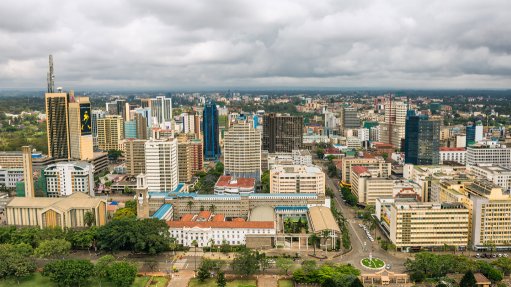
STRATEGIC BASE With several of Turner & Townsend’s multinational clients based in Nairobi, the city was an obvious choice for the location of a new hub
Despite slowing economic growth, political challenges and associated declining investor confidence in many parts of Africa, global project management consultancy Turner & Townsend continues to strengthen its network on the continent as it pursues major projects in mining, oil and gas, infrastructure development and real estate.
“We have developed a loyal client base in Africa and our commitment to quality and the diversity of our business across market sectors as well as geographic locations has buffered us against market volatility. Taking a long-term view, we have continued to invest in building our capability to service our clients in Africa. We are confident that the combination of local resources and global support will continue to be a winning recipe,” says Turner & Townsend regional MD Ian Donaldson.
The company is well established in the Southern African Development Community, with offices in South Africa, Botswana, Zimbabwe, Zambia and Mozambique, and is focusing on growing its presence in East Africa by building capacity in its offices in Kenya, Uganda and Tanzania. In February last year, the company opened a new office in Nairobi, Kenya, which Donaldson says will provide strategic access to projects in the East Africa region.
“With several of our multinational clients based in Nairobi, the city was an obvious choice for the location of a new hub . . . Kenya is by far the biggest economy in the East Africa community and it has good links with countries, such as Rwanda, Uganda, Tanzania and Ethiopia. Nairobi is our second East Africa office, joining our branch in Kampala, Uganda, which was opened in 2012.”
Donaldson points out that, with significant gross domestic product growth rates in the East Africa region, multi-location property programmes and ambitious infrastructure plans will soon follow, adding that there are also substantial natural resources reserves in the region that will attract mining interest as commodity prices recover. As such, the opportunities for Turner & Townsend are significant across the sectors it supports.
“In addition to providing a modernised and more expansive quantity-surveying service for the natural resources, infrastructure development and real estate markets, we also offer project management, project controls and dispute resolution services. Combined with our knowledge and understanding about our local markets and their supply chains, our service portfolio gives us a differentiated and competitive proposition for companies in East Africa that need project support to secure greater capital efficiency and create more affordable assets.”
Turner & Townsend is, moreover, looking to West Africa as a key part of its expansion strategy, with a focus on developing its current project presence in Nigeria, Ghana and Côte d’Ivoire.
The Importance of Project Management
Donaldson highlights that the gestation period from project conception to delivery, and the ability to fund this prolonged process are key challenges when implementing projects in Africa.
The company is well versed in working through these issues with clients and investors, and can help them make strategic decisions regarding the pursuit of projects, pointing out that successful investment in any market requires a combination of global and local expertise.
“Localisation is key to success in Africa, especially as it allows for companies to be competitive while being able to draw on global business for best practice. When planning a capital programme, it is crucial that companies understand and adapt to Africa’s exceptional and unique challenges to access its opportunities.”
Donaldson advises companies investing in Africa or involved in delivering projects on the continent to ensure that they have representatives on the ground to oversee the execution of the project. Moreover, to stay competitive, companies should be using cost-effective local skills that leverage global best practice for consistency. Caution should also be taken when trying to “shoehorn” a solution developed elsewhere as this can easily lead to overpricing projects, it is better to rather use local experts for due diligence and seek local scalable partners that have sufficient and qualified resources to adapt to the project’s changing resource requirements, he adds.
Establishing partnerships with local synergistic companies is wise so that they can interpret what is being communicated within the local context. The robustness of a project should also be safeguarded through regular reporting with an appropriate level of detail, especially in the case of projects that are being managed remotely.
“In most instances, with the right planning, challenges to projects in Africa can be anticipated and mitigated, but it is essential that this planning process begins right from the outset,” concludes Donaldson.